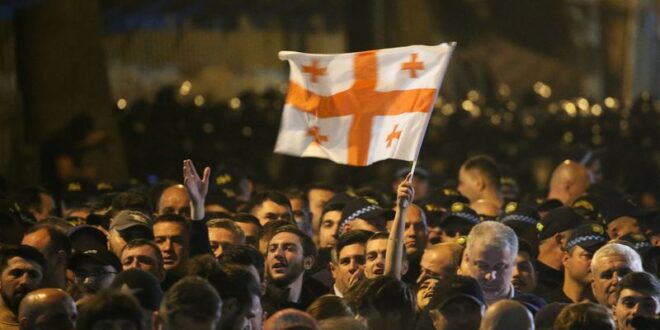TBILISI (Reuters) – Georgia’s parliament on Wednesday approved the first reading of a bill on “foreign agents” that has provoked several days of protests by critics who see it as authoritarian and Russian-inspired, Georgian media reported.
Eighty-three out of 150 deputies voted in favour of the bill, while opposition MPs boycotted the vote. It must pass two more readings before becoming law.
The bill would require organisations receiving more than 20% of their funding from abroad to register as agents of foreign influence, and has been compared by critics to a law that Russia has used extensively to crack down on dissent.
Its fate is widely seen as a test of whether Georgia, 33 years after the collapse of the Soviet Union, intends to pursue a path of integration with the West or move back closer towards Russia.
On Tuesday, protesters clashed with riot police who used pepper spray to clear the area around parliament of thousands of demonstrators shouting slogans against what they call “the Russian law”.
Eleven people were arrested and one police officer was injured. Opposition groups have called for more protests on Wednesday night.
Russia is widely disliked in the South Caucasus country of 3.7 million, which lost a brief war with Russia over the Moscow-backed breakaway territory of South Ossetia in 2008.
The United States, Britain and European countries have all warned against passing the bill. The EU, which gave Georgia candidate status in December, has said the draft law is incompatible with its values.
The Kremlin said on Wednesday that it had nothing to do with the foreign agent bill, which it defended as a “normal practice”. Spokesman Dmitry Peskov said it was being used by outside actors to stoke anti-Russian sentiment.
The ruling Georgian Dream party, which has faced accusations of authoritarianism and excessive closeness to Russia, says the bill is necessary to promote transparency and combat “pseudo-liberal values” imposed by foreigners.
The bill, which was initially introduced in March 2023 but shelved after two nights of violent protests, has increased divisions in an already deeply polarised Georgia.
A coalition of opposition groups, civil society, celebrities, and the country’s figurehead president have rallied against the ruling party to oppose it.
On Wednesday, the captain of Georgia’s national soccer team, which is riding high after qualifying for Euro 2024, its first major tournament, posted a picture on Instagram of two protesters staring down riot police on Tuesday night, adding the message “F*** Russia”.
(Reporting by Felix Light; Editing by Mark Trevelyan)
 BeritaKini.biz Berita Viral Terkini di Malaysia
BeritaKini.biz Berita Viral Terkini di Malaysia





